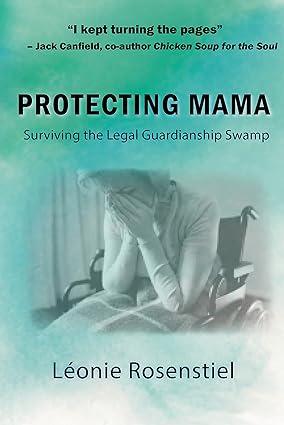An indispensable resource for anybody thinking about taking guardianship of their elderly parents.
Léonie Rosenstiel’s book Protecting Mama: Surviving the Legal Guardianship Swamp offers a startling account of her years-long battle with her ailing mother’s commercial guardian and protector-turned-manipulator and abuser. The struggle for justice and its consequences on her family as she attempts to deal with the problems of a broken system are thoroughly discussed. The unexpected demand from Rosenstiel’s aunt and other family members who wanted to inherit some of her mother’s property was a shocker to Rosenstiel and her brother. The aunt wanted the property right away and was prepared to come down and have Rosenstiel’s mother amend her will. Mama’s heartbreaking diagnosis of Alzheimer’s disease, a degenerative and incurable condition, came shortly after. Her illness made it increasingly difficult for her to manage her financial and personal affairs, necessitating a court-appointed guardianship. Surprisingly, however, the guardians’ interests quickly changed to suit their own, bullying their way past Mama’s family’s interests. The guardianship was able to easily attract the court’s attention and ear while considering Rosenstiel to be a nuisance that needed to be neutralized. This was an unanticipated development. As Mama’s designated spokesperson, they responded negatively to whatever she said, even labeling her as “estranged” from her mother. As Rosenstiel fought for her mother’s rights, the guardianship again managed to get a gag order against her and her legal team, which forbade them from talking about Mama, the guardianship, or any of the guardianship matters in any manner. Violation of the order would result in imprisonment and heavy fines.
Rosenstiel’s voice is replete with anguish and pain throughout this deeply emotional story. She skillfully and exhaustively illustrates the challenges and abuses of adult guardianship. She also highlights the need to recognize the scope of the issue and take action to improve laws, procedures, oversight, and accountability. Her story is among the most painstakingly written genuine stories, and it offers a thorough, considerate, and extremely beneficial analysis of the intricate procedure of taking on the job of legal guardian and how to successfully negotiate it. Protecting Mama aims to equip readers with enough easily comprehensible information and insight to steer clear of the bewilderingly complex guardianship arrangement entirely, as well as to spare others from the financial and emotional hardship of a dysfunctional system. While she makes a compelling case against guardianship, Rosenstiel also wisely provides helpful advice and alternatives to prevent heartbreaking circumstances and to follow clients’ last wishes as much as possible. Written by a family civil rights champion, this is an indispensable resource for anybody thinking about taking guardianship of their elderly parents.







